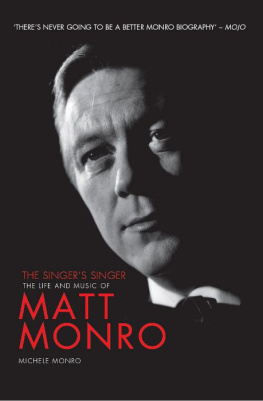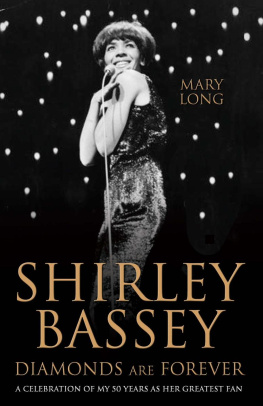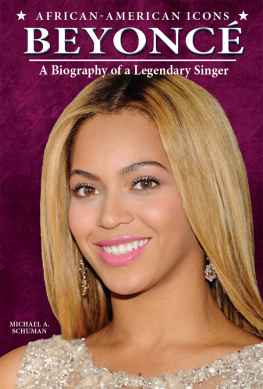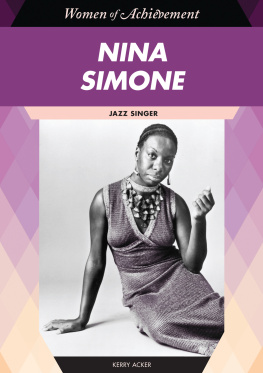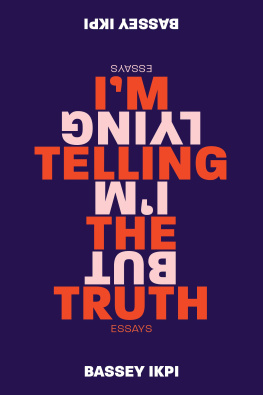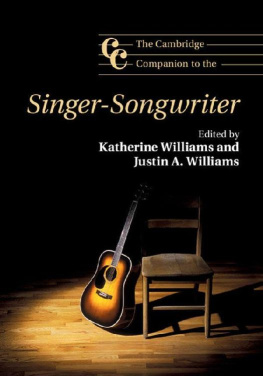MISS SHIRLEY BASSEY
MISS SHIRLEY BASSEY
JOHN L. WILLIAMS


New York London
2010 by John L. Williams
All rights reserved. No part of this book may be reproduced in any form or by any electronic or mechanical means, including information storage and retrieval systems, without permission in writing from the publisher, except by reviewers, who may quote brief passages in a review. Scanning, uploading, and electronic distribution of this book or the facilitation of the same without the permission of the publisher is prohibited.
Please purchase only authorized electronic editions, and do not participate in or encourage electronic piracy of copyrighted materials. Your support of the authors rights is appreciated.
Any member of educational institutions wishing to photocopy part or all of the work for classroom use or anthology should send inquiries to Permissions c/o Quercus Publishing Inc., 31 West 57th Street, 6th Floor, New York, NY 10019, or to .
ISBN 978-1-62365-259-3
Distributed in the United States and Canada by Random House Publisher Services
c/o Random House, 1745 Broadway
New York, NY 10019
www.quercus.com
For Owen
Being Shirley Bassey is a tough way to run a life.
SHIRLEY BASSEY, 1964
CONTENTS
INTRODUCTION
For One Night Only
November 2009. Im standing in the Roundhouse, North London, waiting for Shirley Bassey to come on stage. Theres a real excitement in the air. The crowd, a cheerful mix of gay and straight, young, old and middle-aged, have left the bars and theyre packed into the converted Victorian auditorium waiting to welcome a woman who started her career before most of them were born.
Some of the people here are obviously long-time fans, thrilled to see Dame Shirley again. But there are plenty more who, like me, have never seen her live before; have probably never listened much to her records, beyond the inescapable karaoke classics. But we, all of us, sense that this is something special, that we are about to be in the presence of an actual star. A star from a time when the word meant something.
For young people growing up in South Wales in the 1960s and 1970s, Shirley Bassey was inescapable. She was in the singles charts when I was born, in 1961. She was on TV in the 1970s, when I was growing up. I never thought very much about her: she was just there on the telly, like Coronation Street or cigarette advertisements. Her music was not the music of my generation. Her great brassy voice was as far removed as can be imagined from the punk rock whine of the bands I favored at sixteen. The TV shows she appeared on were the kind of thing my grandmother would watch when she babysat for us on a Saturday night: light entertainment.
If I thought about Shirley Bassey at all, it was because she came from my hometown of Cardiff. Wales being a small place, were always hungry for heroes and heroines, and in the 1970s we didnt have many to choose from. We were always ridiculously proud if someone Welsh appeared on a quiz show or in an episode of Crossroads. Our handful of genuine big names were cherished regardless of whether we actually liked what they did: Richard Burton, Stanley Baker and the young Anthony Hopkins in the world of acting; John Toshack in football; Tommy Cooper in comedy. And in music there was Tom Jones and Shirley Bassey. They were our principalitys representatives in the big, wide world.
I didnt know much about Shirley Bassey, just that she was born in Cardiff, in some dockland neighborhood called Tiger Bay that didnt appear to exist in the actual Cardiff I knew, at least not under that name. She didnt live there any longer, of course; she had become glamorous and lived somewhere appropriate: London or Switzerland or Monte Carlo, somewhere James Bond-ish. I dont recall her racial background as impinging on me at all. She certainly didnt seem black in the way that Bob Marley, say, or even Diana Ross was: thats to say recognizably belonging to a black culture. Shirley Basseys culture seemed to be that of international showbiz, and her natural skin tone not that far different from the permatan of a Sacha Distel or Cliff Richard.
As I grew up and moved out of Wales I came across her less often, but throughout the next couple of decades her name would flicker into the national consciousness from time to time. A court case covered in the papers; a TV special glimpsed in a pub; a breakfast time TV interview lying on a bed with Paula Yates; launching the Rugby World Cup wearing a dress made out of the Welsh flag. Somewhere along the way shed become part of Welsh heritage: a national monument, the girl from Tiger Bay.
But even so, I took her existence for granted. It was a chance viewing of a TV show that made me stop and reconsider. The program was a fairly basic run-through of Dame Shirleys career, but right at the beginning there was a piece of very early live footage. She was eighteen or so, belting out a song Id never heard before called Burn My Candle, in front of a very staid 1950s TV orchestra. Everything about it was as cheesy as you might expect, yet the young Shirley was a revelation. She had her natural Afro haircut short and she had a direct sexuality that seemed completely alien to everything I thought I knew about the austerity Britain of the 1950s.
Afterward, when I started thinking more about the Bassey career, and reading up some basic biographical information, it struck me for the first time just how extraordinary her achievement was. Break it down to its bare essentials: in 1954 she was a seventeen-year-old black single mother living in Splott, Cardiff. Ten years later, when she recorded Goldfinger, she was an international star and seemed to come from the planet Glamour, which is a long way from Splottand I speak as someone who lived there for a short while.
And the more I researched the more remarkable her story seemed. From the Tiger Bay of the 1930s, to the variety theaters of the early 1950s, to the Soho clubs of the late 1950s, Shirley Basseys life had been lived in a series of now vanished worlds, each of them a strange mix of the glamorous and the grim. So I resolved to write about her life, not the whole of it but the decades that shaped her. I would end the story in 1967, when she was thirty years old and an established star. For me its always the route to the top that fascinates, not life at the top, with its endless round of TV specials, profiles in Hello, and albums of Andrew Lloyd Webber songs.
The more I learned about the young Shirley Bassey, the more she fascinated me. Very different from the diva stereotype: a deeply insecure and troubled, but remarkably brave, young woman. One whod found herself thrust into a stardom shed never anticipated or even particularly wanted, and was oscillating between having the time of her life and feeling desperately lost and alone. That said, she was also, and remains, a born survivor.
So where did it come from, the strength that allowed the young Shirley to win through in a world that routinely ate up starlets and spat them out again? The answer, I think, has to be from her mother. For if Shirley Basseys story is a remarkable one of triumph against the odds, her mother Eliza Janes is hardly less extraordinary and in many ways surprisingly similar. Both mother and daughter knew what it was like to have children out of wedlock when they were young, to leave the place they grew up in and make a new life on their own in a new city; both had their lives dogged by scandalboth even had lovers pull guns on them.
Next page

